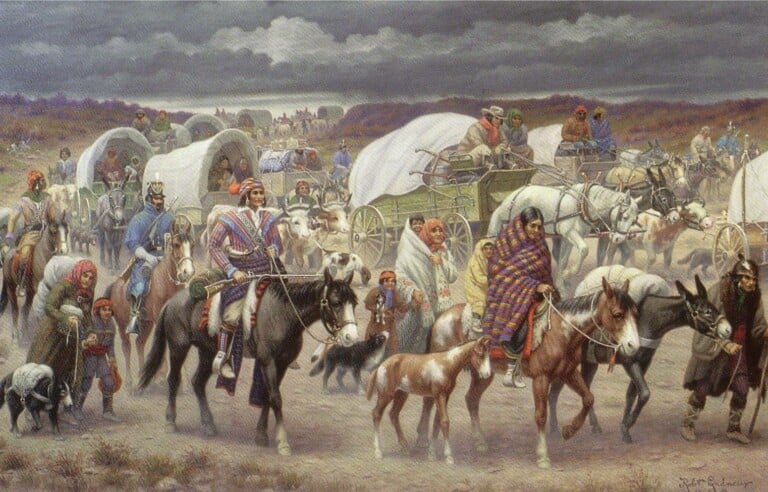Moving west
In 1783, more and more settlers had set in the new territories between the Appalachian Mountains and the Mississippi River.
Settlers journeyed across the mountains to create new settlements out of the wilderness.
The problem was that Indians already lived there: settlers were perceived as thieves and this led to a struggle for land in the late 18th century.
The new Government tried to keep peace with the Natives by treaties but they were never respected, for obvious reasons.
President James Monroe wrote that the Natives’ hunting way of life “required a greater extent of territory that is compatible with the progress of civilized life and must yield to it. If the Indian tribes do not abandon that state and become civilized, they will decline and become extinct”.
Therefore, the only way to survive for Natives is to be moved further West into “Indian territories”. In 1830, the American Government passed a law to put this policy into practice, the Indian Removal Act.
One of the most tragic examples is that of the Cherokees, who were the first to suffer from this policy. The Cherokees had evolved into a civilized community and had followed the White rules: they had their newspapers and their constitution, modelled on the American one. But none of this saved them.
In the 1830’s, Congress decided their land belonged to Georgia and that it had to be sold to White settlers. The Cherokees were forced to march hundreds of miles to reach Oklahoma.
With the terrible winter of 1830, their journey turned out to be a nightmare that lasted 5 months. A quarter of the Cherokee nation perished: it was called the “Trail of Tears“.
The Federal Government started to organize the land for settlement: land should be surveyed and divided into square units called “townships” (about 6 x 6 miles). It marked the beginning of the gigantic expansion.
The War of 1812
In June 1812, Congress declared war on Britain. American ships won several battles at sea but the British Navy gained complete control and blockaded American harbors.
The Americans also tried to invade Canada (a territory ruled by the British) but they failed. British forces captured and burnt the city of Washington, the capital of the USA: symbolic defeat.
In December 1814, the peace was signed in Europe but two weeks later, British forces attacked New Orleans because they did not know peace was signed.
That was a lesson for the Americans, especially for the industry: Americans began to make their goods on their own. America was to become a manufacturing industry.
Even Jefferson, who was against manufacturing, turned about when he realized how important it was. War became an economic development and there was a need to “place the manufacturer at the side of the agriculture”.
“Old Hickory”: Andrew Jackson
Andrew Jackson was a hero of the Frontier and was nicknamed “Old Hickory”. He differed from the former Presidents, who were all rich and coming from the Atlantic settlements.
Indeed, he was from a poor family from the West Coast who fought for the Frontier and who became a rich landowner.
Jackson was elected in 1828 and he was one of the founders of the Democratic Party: the Government should be organized to benefit the “Great Body” of the USA.
He was mainly elected (and re-elected in 1832) by planters, farmers, mechanics, and labourers because the keyword of his policy was “cheap”:
- money: low rates of interest
- land: forcing Indians West
- manufacturing goods: reducing import duties
Jackson was responsible for the slow annihilation of the Natives. His attitude is controversial today: some historians think he was concerned with his interest (a populist).
Those who stand for him, on the contrary, highlight the fact that Jacksonian Democracy was an important landmark in American history.
Synopsis » From the Puritan settlements to the American Civil War (1787-1877)
- Antebellum South
- Introduction to Puritanism and Expansionism
- Life in the Plantations
- USA: North and South
- O’Sullivan’s Manifest Destiny
- The social context of America in the early 19th century
- The American Civil War: 1861-1865
- America: The New Nation
- After the American Civil War: The Reconstruction
- America: West to the Pacific
- Years of Growth

